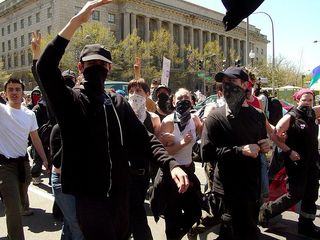Still working to recover. Please don't edit quite yet.
black bloc
The "Black Bloc
A black bloc is an affinity group of individuals, that come together during some sort of protest, demonstration, or event involving class struggle, anti-capitalism, or anti-globalization, and wear all black. Black clothing and masks are used to make the bloc appear to be one large mass, promote solidarity, create a clear revolutionary presence (usually associated with anarchism, sometimes also with communism), and also to avoid being identified by authorities. There is a mistaken belief, especially among the mainstream news media, that the "Black Bloc" is an international organization of some kind, when in fact it is nothing more than a tactic used by a subset of demonstrators. There may be several black blocs within a particular protest, with different aims and tactics. As an ad hoc group, they share no universally common set of principals or beliefs, however, black blocs that have formed in the past have been made up largely of anarchists, but can include many other anti-capitalist groups. Like all affinity groups, they are based on common trust between those involved, and usually share a common goal such as blocking delegates from entering a trade meeting, and a mutual understanding of shared tactics.
Black blocs are differentiated from other anti-globalist groups by their routine use of vandalism and property destruction to bring attention to their opposition to multi-national corporations and the support perceived to be enjoyed by these companies from Western governments. An example of this activity is the destruction of storefronts of The Gap, Starbucks, Old Navy, and other retail locations in downtown Seattle during the 1999 anti-WTO demonstrations.
The tradition of black blocking grew out of the autonomen movements in Germany in the 1980s; Autonomen wore black during militant action in the process of squat defenses, and during solidarity-demonstrations for the Red Army Faction. One explanation for the Autonomen's clothing choice is that black was the color of the leather jackets that squatters wore for warmth and to deflect blows from police batons, whereas ski masks were practical ways to filter out tear gas and to protect one's identity. They were dubbed by the German media as der schwarze Block. The tradition was first seen in the United States of America during protests against the Gulf War in Iraq, February 1991 where it was initiated by Love and Rage, a North American revolutionary anarchist organization. Black as a color has historically been associated with anarchism, dating back to the black flags which accompanied bread riots at the time leading up to the Paris Commune.
Typical actions of a black bloc are marching in a bloc, being a visible manifestation of anarchist and anti-capitalist politics, taking to the streets without a permit, distracting police, misleading police about protester motions, 'unarresting' people already arrested by police, administering first aid to persons affected by tear gas in areas where protesters are barred from entering, building barricades, attacking/disarming police, and unmasking police who pose as black blockers. Some black blockers also engage in vandalism, rioting and street fighting. Although black blocking is usually connected with some form of direct action, black blocs also participate in wholly symbolic action, as well as actions that fall entirely within traditional definitions of nonviolent protest. Property destruction carried out by black blocs tends to have symbolic significance: common targets include banks, institutional buildings, outlets for multinational corporations, pornography and sex shops, gasoline stations, and video-surveillance cameras. The reasons for engaging in property destruction often include reasons other than symbolic protest.
Groups such as the WOMBLES and Wild Greens advocate participating in black bloc activity, and have similar agendas. Groups that have engaged in similar forms of action include Radical Anti-Capitalist Blocs, Anti-Racist Action, and Anti-Fascist Action. During the 2003 G8 summit in Evian, militant demonstrators rejected the name "Black Bloc" and chose instead to be called the "Anthracite Bloc" or the "Charcoal Bloc."
After the protests of global summits that occurred across Europe during the summer of 2001, European courts have started to prosecute activists on mafia, gang, conspiracy, racketeering, and terrorism charges for alleged black bloc activity. This was the case with the Publixtheatre Caravan, a group of 25 artists imprisoned for a month after the G8 summit in Genoa. The European Union is conducting Europe-wide investigations of black bloc activity in terms of an international conspiracy. The heavy sentences given to demonstrators arrested during and after the European Union summit in Gothenburg 2001 (see also Terrorister), as well as the terrorism charges levied against those arrested during and after the G8 summit in Genoa, 2001, and the European Union summit near Thessaloniki, Greece, 2003, reflect this view.
See also[edit]
External links[edit]
- Black Blocs for Dummies
- Blocs, Black and Otherwise
- Black Block: Presentation and analyzes by a militant (French)
- Nonviolence, Trashing and Movement Strategy
- Washington Post account of a confrontation between a black bloc and "Protest Warriors"
- Italy G8 'brutality' trial opens
- Block Bloc in Germany at an anti-nazi protest
- Direct Action Primer/Black Bloc
| This article contains content from Wikipedia. Current versions of the GNU FDL article en:Black bloc on WP may contain information useful to the improvement of this article | WP |
